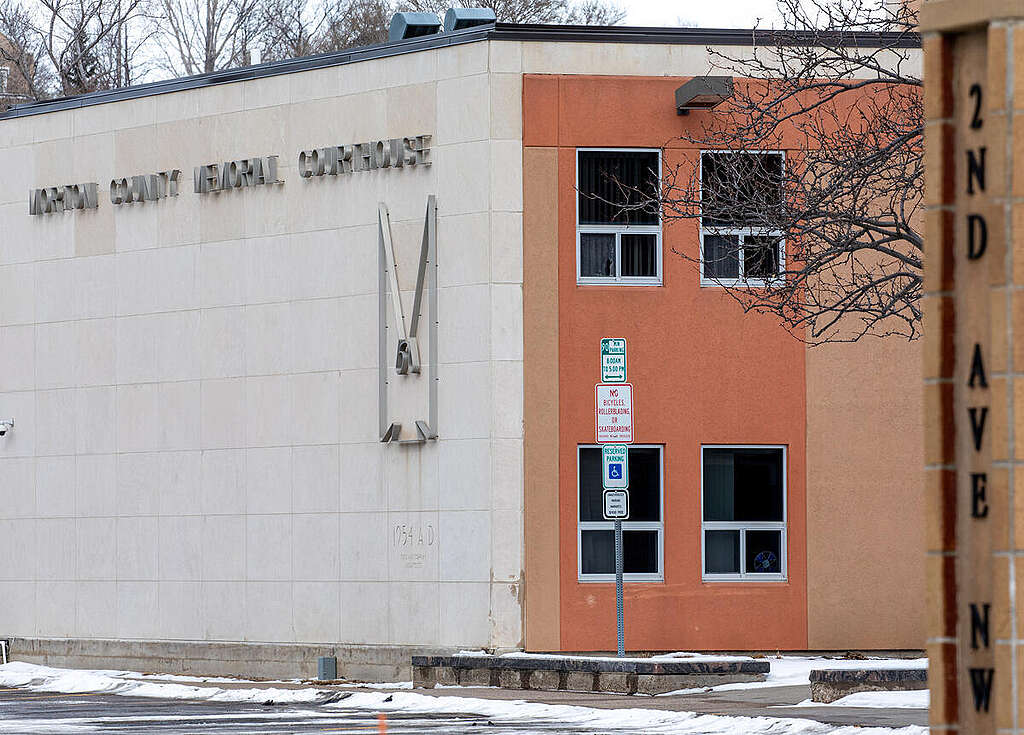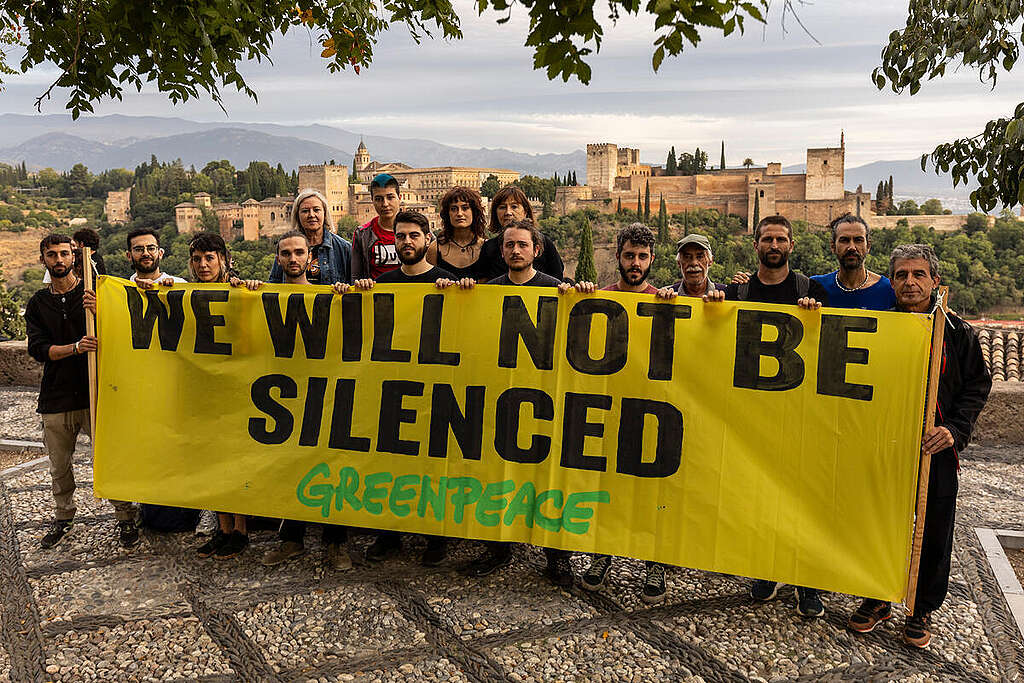An interview with Greenpeace International General Counsel Kristin Casper
Onward. Because we will not back down. We will not be silenced.
The fight against Energy Transfer's SLAPP continues - and it is far from over. The stakes of this bullying lawsuit by the Texas-based Big Oil company behind the infamous Dakota Access Pipeline are too high to rest until justice is served. We will not back down, we will keep going, together.
The lawsuits filed by Energy Transfer (ET) against Greenpeace International (GPI) and two Greenpeace entities in the United States (Greenpeace Inc., and Greenpeace Fund) since 2017 are clear-cut examples of SLAPPs (Strategic Lawsuits Against Public Participation). Like all SLAPPs, ET's lawsuits have been an attempt to bury nonprofits and activists in legal fees, push them towards bankruptcy, and ultimately silence dissent. Not only does Energy Transfer's SLAPP attempt to erase the Indigenous leadership of the Standing Rock movement, but it poses a threat to free speech, basic expressions of solidarity, and peaceful protest.
The absurd US$ 660 million jury verdict against Greenpeace entities in North Dakota made news, but this fight is bigger than the Greenpeace network. With the overwhelming support of allies all around the world, the defence against Energy Transfer's bullying tactics will continue for as long as it takes to secure the freedoms we all need to deliver a green, just and peaceful future for all. After nearly a decade of defending these SLAPPs, the Greenpeace Legal departments are prepared to continue as long as it takes!
To get a better understanding of the legal process and next steps of how the jury verdict in North Dakota fits into the ongoing legal fight against Energy Transfer's SLAPP, let's ask a few questions to Greenpeace International's General Counsel, Kristin Casper:
Is this fight over?
Kristin Casper: Absolutely not, this fight is far from over. Big Oil thinks they can bully us into silence, but we won't be silenced.
In this fight with Energy Transfer, we know the facts are on our side.
The Greenpeace entities in the US have already announced an intention to appeal, in the event that the trial court does not itself overrule the jury's verdict. Greenpeace International is weighing all legal options, including appeal, to challenge this wrongful SLAPP suit by Energy Transfer. We believe we have many and strong grounds for appeal based on how the trial was conducted.
At this moment, we are preparing legal filings that call for this North Dakota verdict to be overturned. Meanwhile, in Europe, Greenpeace International has already filed an anti-SLAPP lawsuit in Dutch court, to recover all damages and costs suffered as a result of ET's back-to-back SLAPP lawsuits against us, and we are looking forward to seeing Energy Transfer in court.
This isn't just a fight for Greenpeace defendants: it's a fight about the protection of fundamental rights for everyone. We are committed to our values, such as nonviolence, independence, and promotion of solutions. We won't back down from them. This is the kind of fight that we were made for.
Greenpeace needs your support against Big Oil's attempt to silence us!
Were you surprised by the jury verdict?
KC: Anytime there is injustice, a feeling of shock and consternation follows, but so does a drive to correct a wrong. That said, we knew going into this trial that the deck was unjustly stacked against us. This case should have been thrown out long before it ever made its way to a jury trial, as a matter of law.
What happens in Morton County after the jury verdict?
KC: The trial court must decide whether to confirm, revise, or vacate the verdict. Generally, the decision can only be appealed once a final judgment by the trial court is entered.
Why was Morton County the wrong place for this case to be tried?
KC: The community in Morton County should not have had to bear the burden of this case. Every judge in this district recused themselves from presiding over the case. To fill the gap, the court had to bring in a judge from another district. The case should have been dismissed but if a trial were to happen at all, it should have been moved to another venue to ensure the fairness of the proceedings.

What are some of the most obvious grounds for an appeal?
KC: There are very strong grounds for appeal. There have been so many extremely prejudicial errors in these proceedings that the question is rather where we should start.
But just to name a few, here are some potential grounds for appeal, by way of example:
- The District Court's lack of jurisdiction over Greenpeace International;
- The lack of evidence to support key findings;
- The exclusion of key evidence supporting the defense;
- The inclusion of irrelevant and prejudicial evidence; and
- Ongoing concerns about the fairness and impartiality of the jury and the denial of requests for a change in venue.
You can get a feel for our strong arguments by reading GPI's motion for summary judgment, which was denied without any substantive reasoning.
Do Greenpeace entities really have to pay US$660 million?
KC: No. Nor could they. Greenpeace entities don't have that kind of money. There is no scenario in which Energy Transfer gets paid this ridiculous amount.
But also, there are many legal steps between this verdict and even the potential enforcement of it, and justice and the facts are on our side. That's why Greenpeace International has brought a suit against Energy Transfer in the Netherlands: showing that, as a result of their abusive lawsuits, it is actually Energy Transfer that owes Greenpeace International compensation.
We are prepared to take this fight every step of the way, and we are confident in our ability to correct the record and be made whole.
Why is Greenpeace International suing Energy Transfer in the Netherlands?
KC: Greenpeace International is suing Energy Transfer LP, Energy Transfer Operating, L.P. and Dakota Access LLC to recover all damages and costs it has suffered as a result of ET's back-to-back SLAPP lawsuits demanding Greenpeace International and the Greenpeace entities in the United States pay hundreds of millions of dollars in damages. The first preliminary hearing in Greenpeace International's anti-SLAPP suit against Energy Transfer is set for July 2, 2025.
How long might it take for the Dutch case and US appeal(s) to play out?
KC: We don't know at this point. But in general, legal proceedings take a long time.
In the US, the appeal to the North Dakota Supreme Court may not even be the end of the legal proceedings. This legal battle with Energy Transfer has already been going on for upwards of eight years (since 2017), but however long it takes, is how long we will stay strong.
The goal of SLAPP suits is precisely that: to tie up resources, to wear us down, and pull us away from continuing to pursue our campaign goals: but unlike many smaller organisations and individuals that face such tactics, Greenpeace International is built to withstand this pressure: our campaigns are as big and bold and impactful as ever before.
Even while representatives from the Greenpeace parties were present in Mandan, North Dakota for the duration of the trial, the Greenpeace ship Rainbow Warrior was being welcomed back to the Marshall Islands to start a six-week mission around the Pacific nation to elevate calls for nuclear and climate justice; and support independent scientific research into the impacts of decades-long nuclear weapons testing by the US government. Forty years earlier, Greenpeace crew evacuated over 300 people from the Rongelap atoll to Mejatto island, after toxic nuclear fallout from the Castle Bravo test rendered their ancestral lands uninhabitable. Across decades and despite many setbacks, the work of the Greenpeace movement continues.
Do you expect to win?
KC: Our goal has always been bigger: our fight is for the hearts and minds of people to ensure the sustainability of life in all its diversity on this beautiful planet, and when it comes to that fight: we are in it to win it.







